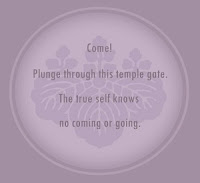 May your heart always be full and your bubble empty, like the Buddha under the Bodhi tree (Wisdom Quarterly). Art by Andrew Yiallilouros (Yialli/Flickr).
May your heart always be full and your bubble empty, like the Buddha under the Bodhi tree (Wisdom Quarterly). Art by Andrew Yiallilouros (Yialli/Flickr). BODHI DAY (Thursday, Dec. 8, 2011) is the Mahayana Buddhist holiday that commemorates the day the historical Buddha, Siddhartha Gautama (a.k.a. Shakya-muni, the "Sage of the Shakyas") experienced enlightenment, called bodhi in Sanskrit and Pali.
BODHI DAY (Thursday, Dec. 8, 2011) is the Mahayana Buddhist holiday that commemorates the day the historical Buddha, Siddhartha Gautama (a.k.a. Shakya-muni, the "Sage of the Shakyas") experienced enlightenment, called bodhi in Sanskrit and Pali.
- The older Theravada school adheres to the ancient tradition that "Bodhi Day" took place, like the Buddha's birthday and final-nirvana day, on the full moon day of VESAK.
 Siddhartha sat under the Bodhi Tree despite adversaries pursuing serenity-and-insight until he broke through to an understanding the end of suffering (Marina Nozyer).
Siddhartha sat under the Bodhi Tree despite adversaries pursuing serenity-and-insight until he broke through to an understanding the end of suffering (Marina Nozyer).How did Siddhartha do it?
 According to tradition, Siddhartha turned his back on years of extreme austerities. He took up the zens (Sanskrit, dhyanas, Pali, jhanas), which are pleasurable states of meditative absorption.
According to tradition, Siddhartha turned his back on years of extreme austerities. He took up the zens (Sanskrit, dhyanas, Pali, jhanas), which are pleasurable states of meditative absorption.
Asking himself if this happy way might be the path to the end of suffering, he experienced an intuitive certainty that it was. He had avoided all pleasure as part of his ascetic practices, but now understood that pleasure divorced from sensuality need not be fear.
 He resolved to sit under a Pipul tree, Ficus religiosa, and let go, meditating until the absorptions purified his mind/heart of the Five Hindrances.
He resolved to sit under a Pipul tree, Ficus religiosa, and let go, meditating until the absorptions purified his mind/heart of the Five Hindrances.
Then he began to systematically practice for liberating insight through mindfulness within four arenas -- tracing the dozen links of Dependent Origination until he found the roots of suffering (ignorance and craving). In craving he saw a chink in the armor, an escape from suffering (from dukkha or "disappointment").
He realized the direct liberation of the heart and mind from clinging and wrong view. Light dawned, and delusion was displaced by wisdom. He awakened from the illusion (maya) and was supremely enlightened: This differed from the enlightenment of disciples in that one who is "supremely" enlightened is able to effectively teach and establish the path he had rediscovered.
 Traditional Zen monastics engaged in zazen, sitting with the (unspoken and often unrecognized) aim of absorption (zen, ch'an, seon, thien, samten). Most sit aimlessly secretly hoping something will happen. If it does, they realize the value of not limiting themselves to an aim. If it does not, before long they will not be sitting at all but engaged in koans, raking, flower arranging, calligraphy, martial arts, cooking, washing dishes, drinking, or anything else that can be called "Everyday Zen."
Traditional Zen monastics engaged in zazen, sitting with the (unspoken and often unrecognized) aim of absorption (zen, ch'an, seon, thien, samten). Most sit aimlessly secretly hoping something will happen. If it does, they realize the value of not limiting themselves to an aim. If it does not, before long they will not be sitting at all but engaged in koans, raking, flower arranging, calligraphy, martial arts, cooking, washing dishes, drinking, or anything else that can be called "Everyday Zen."
 But traditions vary on what happened. Some say he made a great vow to Earth to achieve nirvana (find and uproot the cause of suffering) or die trying.
But traditions vary on what happened. Some say he made a great vow to Earth to achieve nirvana (find and uproot the cause of suffering) or die trying.
In other traditions, while meditating he was harassed and tempted by the supernatural Mara (Sanskrit, the "Destroyer"), a being delighting in cupidity and illusion.
Other traditions simply say that he entered deeper and deeper states of absorption (zen, dhyana, jhana), confronting and questioning assumptions about the nature of "self." What he discovered by following the maxim "Know thyself" could not have been expected. The Truth itself set him free.
In the Pali Canon, various discourses (sutras) by the Buddha relate to what happened. In "The Longer Discourse to Saccaka" (MN 36), the Buddha describes his overnight enlightenment in three stages:
- During the first watch of the night, he discovered his innumerable past lives cycling through rebirth.
- During the second watch, he fully penetrated the Law of Karma as part of the fourth Noble Truth: the Noble Eightfold Path that leads to the end of all suffering.
- During the third watch, he rediscovered all Four Noble Truths, culminating in nirvana.
In the Buddha's words:
Sunday, Dec. 11, 8:30 am
 Following the end of Rohatsu sesshin [NOW IN PROGRESS and open to everyone on a drop in basis] the evening before, we will have a service commemorating the enlightenment of the Buddha Siddhartha Gautama under the Bodhi Tree. Everyone is welcome and encouraged to attend this annual observance.
Following the end of Rohatsu sesshin [NOW IN PROGRESS and open to everyone on a drop in basis] the evening before, we will have a service commemorating the enlightenment of the Buddha Siddhartha Gautama under the Bodhi Tree. Everyone is welcome and encouraged to attend this annual observance.























































































































































































































































No comments:
Post a Comment